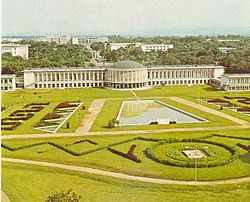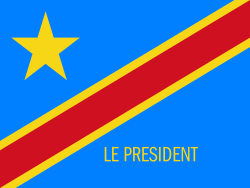President of the Democratic Republic of the Congo
| President of the Democratic Republic of the Congo | |
|---|---|
|
Presidential Standard | |
|
Presidential Seal | |
| Residence | Palais de la Nation Kinshasa, Democratic Republic of the Congo |
| Term length | 5 years, renewable once |
| Inaugural holder | Joseph Kasavubu |
| Formation | 1 July 1960 |
 |
| This article is part of a series on the politics and government of the Democratic Republic of the Congo |
|
|
Politics portal |
The president of the Democratic Republic of the Congo (French: Président de la République démocratique du Congo, Swahili: Rais wa Jamhuri ya Kidemokrasia ya Kongo, Lingala: Mokonzi wa Republíki ya Kongó Demokratíki), is Congo's elected Head of State, and the ex officio "Supreme Commander" (Commander-in-Chief) of the Armed Forces of the Democratic Republic of the Congo (FARDC).
The position of president in the DRC has existed since the first constitution – known as The Fundamental Law – of 1960. However the powers of this position have varied over the years, from a limited shared role in the executive branch, with a prime minister, to a full-blown dictatorship. Under the current constitution, the President exists as the highest institution in a semi-presidential Republic.
The current president is Joseph Kabila. He is protected by the Republican Guard.
Presidential powers
The semi-presidential system established by the constitution is largely borrowed from the French constitution. Although it is the prime minister and parliament that oversee much of the nation's actual lawmaking, the president wields significant influence, both formally and from constitutional convention. The president holds the nation's most senior office, and outranks all other politicians.
Perhaps the president's greatest power is his or her ability to choose the prime minister. However, since only the National Assembly has the power to dismiss the Prime Minister's government, the president is forced to name a prime minister that commands the support of the majority of this assembly.
- When the majority of the Assembly has opposite political views to that of the president, this leads to political cohabitation. In that case, the president's power is diminished, since much of the de facto power relies on a supportive prime minister and National Assembly, and is not directly attributed to the post of president. Still, the constitutional convention is that the president directs foreign policy, though he must work on that matter with the Minister of Foreign Affairs.
- When the majority of the Assembly sides with him, the President can take a more active role and may, in effect, direct government policy. The prime minister is de often a mere "fuse" – and can be replaced if the administration becomes unpopular.
Among the formal powers of the president:
- The president ensures respect of the Constitution and ensures the proper functioning of the public authorities and institutions as well as the continuity of the State. He guarantees the independence, territorial integrity, and sovereignty of the nation and ensures the observance of international treaties.[1]
- The president appoints the Prime Minister and, acting on the advice of the latter, appoints and removes the other members of the government.[2]
- The president convokes and presides at meetings of the Council of Ministers, promulgates the laws, and issues ordinances[3]
- The president invests the elected Governors and Vice-Governors of the Provinces with their powers.[4]
- The president appoints, suspends, and removes, on the proposal of the government and after deliberation by the Council of Ministers:[5]
- Ambassadors and other diplomatic personnel;
- Officers of the armed forces and national police, after hearing the opinion of the High Defense Council;
- The general chief of staff, the chiefs of staff and the commanders of the main branches of the armed forces, after hearing the opinion of the High Defense Council;
- High-ranking civil servants;
- Persons in charge of public services and establishments;
- Representatives of the State (other than auditors) in public enterprises;
- Judges and public prosecutors on the proposal of the High Council of the Judiciary.[6]
- The president is the commander-in-chief of the armed forces and chairs the High Defense Council.[7]
- The president confers national honors.[8]
- The president may declare a state of emergency or a state of siege "When grave circumstances constitute a present threat to the independence or the integrity of the national territory or when they provoke the disruption of the proper functioning of the institutions."[9]
- The president may declare war with the authorization of both chambers of parliament, after deliberation by the Council of Ministers, and after hearing the opinion of the High Defense Council.[10]
- The President may grant pardons or commute or reduce sentences.[11]
- The President appoints and accredits ambassadors to foreign countries and international organizations, and receives ambassadors accredited to the Democratic Republic of the Congo.[12]
- The President defines national policy in coordination with the government and is responsible, in cooperation with the government, for defense, security, and foreign affairs.[13]
- The president has a very limited form of suspensive veto: when presented with a law, he or she can request another reading of it by parliament, but only once per law.[14]
Requirements
Article 72 of the Congolese constitution states that the President must be a natural-born citizen – or more accurately: French: citoyen d'origine – of the Democratic Republic of the Congo, and at least 30 years of age. Additionally, the President must be free of any legal constraints on their civil and political rights.
Article 10 of the same constitution defines citoyen d'origine as : "anyone belonging to the ethnic groups whose persons and territory constituted what became the Congo (currently the Democratic Republic of the Congo), at independence".
Succession
Articles 75 and 76 of the constitution state that upon the death or resignation of the President, the vacancy of the position is declared by the Constitutional court. The President of the Senate then becomes interim president.
The Independent Electoral Commission has to organize elections between sixty (60) and ninety (90)[15] days after the official declaration of vacancy by the Constitutional court.
Other information

Kinshasa, Democratic Republic of the Congo
The official office of the president is the Palais de la Nation (Palace of the Nation) in Kinshasa.
The official residence of the president is the Camp Tshatshi Palace in Kinshasa, although it has not been used since it was looted in 1997. Other presidential residences include:
- the Palais de Marbre; it houses foreign official guests;
- the Domaine de la Rwindi in Goma, Nord-Kivu;
Election
Under the 2006 constitution, the President is directly elected to a five-year term – renewable only once – by universal suffrage. The first President to have been elected under these provisions is Joseph Kabila, in the 2006 elections.
In the DRC, the president is elected by a Two-round system of voting, which ensures the elected President always obtains a majority of the vote. If none of the candidates manage to receive the majority of the votes then the top two candidates in the election arrive at a run off. This allows smaller parties to have a greater impact on the outcome of elections, thus guaranteeing a multi-party system, as opposed to a two-party system.
After the president is elected, he goes through a solemn investiture ceremony.
2006 election
| Candidate | Party | Votes | % |
|---|---|---|---|
| Joseph Kabila | Independent | 7,590,485 | 44.81% |
| Jean-Pierre Bemba Gombo | Movement for the Liberation of Congo | 3,392,592 | 20.03% |
| Antoine Gizenga | Unified Lumumbist Party | 2,211,280 | 13.06% |
| Nzanga Mobutu | Union of Mobutist Democrats | 808,397 | 4.77% |
| Oscar Kashala | Union for Congo's Reconstruction | 585,410 | 3.46% |
| Azarias Ruberwa Manywa | Congolese Rally for Democracy | 285,641 | 1.69% |
| Pierre Pay-Pay wa Syakasighe | Federalist Christian Democracy-Convention of Federalists for Christian Democracy | 267,749 | 1.58% |
| Vincent de Paul Lunda-Bululu | Rally of Social and Federalist Forces | 237,257 | 1.40% |
| Joseph Olenghankoy Mukundji | New Forces for Union and Solidarity | 102,186 | 0.60% |
| Pierre Anatole Matusila Malungenine Kongo | Independent | 99,408 | 0.59% |
| Antipas Mbusa Nyamwisi | Renewal Forces | 96,503 | 0.57% |
| Bernard Emmanuel Kabatu Suila | USL | 86,143 | 0.51% |
| Eugène Diomi Ndongala | Christian Democracy | 85,897 | 0.51% |
| other candidates | 2,319,547 | 6.42% | |
| Total (turnout 70.54%) | 17,931,238 | ||
| Source: CEI-RDC | |||
2011 election
| Candidate | Party | Votes | % |
|---|---|---|---|
| Joseph Kabila | Independent | 8,880,944 | 48.95% |
| Étienne Tshisekedi | Union for Democracy and Social Progress | 5,864,775 | 32.33% |
| Vital Kamerhe | Union for the Congolese Nation | 1,403,372 | 7.74% |
| Léon Kengo | Union of Forces of Change | 898,362 | 4.95% |
| Antipas Mbusa | Independent | 311,787 | 1.72% |
| Nzanga Mobutu | Union of Mobutuist Democrats | 285,273 | 1.57% |
| Jean Andeka | Alliance of Congolese Nationalist Believers | 128.820 | 0.71% |
| Adam Bombolé | Independent | 126,623 | 0.70% |
| François Nicéphore Kakese | Union for the Revival and the Development of Congo | 92,737 | 0.51% |
| Josué Alex Mukendi | Independent | 78,151 | 0.43% |
| Oscar Kashala | Union for the Rebuilding of Congo | 72,260 | 0.40% |
| Total (turnout 58.81%) | 18,911,572 | 100.00% | |
| Source: CENI-RDC | |||
See also
Historical:
- Colonial Heads of Congo
- Rulers of Katanga
- Rulers of Kuba
- Rulers of Luba
- Rulers of Ruund (Luunda)
- Rulers of Kasongo Luunda (Yaka)
- Rulers of Kongo
- Zaire
References
- ↑ Constitution of the Democratic Republic of the Congo, 2006, article 69.
- ↑ Constitution of the Democratic Republic of the Congo, 2006, article 81
- ↑ Constitution of the Democratic Republic of the Congo, 2006, article 79
- ↑ Constitution of the Democratic Republic of the Congo, 2006, article 80
- ↑ Constitution of the Democratic Republic of the Congo, 2006, article 81
- ↑ Constitution of the Democratic Republic of the Congo, 2006, article 82
- ↑ Constitution of the Democratic Republic of the Congo, 2006, article 83
- ↑ Constitution of the Democratic Republic of the Congo, 2006, article 84
- ↑ Constitution of the Democratic Republic of the Congo, 2006, article 85
- ↑ Constitution of the Democratic Republic of the Congo, 2006, article 86
- ↑ Constitution of the Democratic Republic of the Congo, 2006, article 87
- ↑ Constitution of the Democratic Republic of the Congo, 2006, article 88
- ↑ Constitution of the Democratic Republic of the Congo, 2006, article 91
- ↑ Constitution of the Democratic Republic of the Congo, 2006, article 137
- ↑ Constitution of the DRC
External links
| ||||||||||||||
| ||||||||||||||||||||||||||||||||||||||


